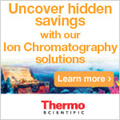|
Chromatography Corner |
|
Improving Hydraulic Fracturing Fluid Analysis Using the Kendrick Mass Defect
The Kendrick mass defect combined with liquid chromatography quadrupole time-of-flight mass spectrometry, can offer a variety of benefits to analysts investigating groundwater contamination that may be linked to surfactants in hydraulic fracturing fluids. To find out more, LCGC spoke to Thomas Borch from Colorado State University in Colorado, about his work in this area.
More... |
| |
New Orbitrap-Based Mass Spectrometer Makes High-Resolution Accurate-Mass Analysis Widely Accessible
Designed for laboratories performing food and environmental testing, and clinical research, forensic toxicology, pharmaceutical/biopharmaceutical applications, the Thermo Scientific™ Q Exactive™ Focus mass spectrometer democratizes HRAM analysis, enabling highly-selective quantitative and qualitative analysis in a single affordable system.  Learn More Learn More
|
|
| |
| Featured Articles |
|
Rapid Sample Preparation and Fast GC–MS-MS for the Analysis of Pesticides and Environmental Contaminants in Fish
A rapid, high-throughput analytical method was developed and evaluated for the simultaneous determination of pesticides and environmental contaminants in fish. The compounds included polycyclic aromatic hydrocarbons (PAHs), polychlorinated biphenyls (PCBs), polybrominated diphenyl ethers (PBDEs), and flame retardants. The method was based on a QuEChERS (quick, easy, cheap, effective, rugged, and safe) technique with acetonitrile extraction, and a dispersive solid-phase extraction (dSPE) cleanup. Three sorbent combinations were compared for cleanup efficiency and recoveries of the contaminants: C18+PSA, traditionally used for lipid removal in dSPE, and two novel sorbents, based on silica coated with zirconium dioxide (ZrO 2 ) and ZrO 2 /C18, designed for phospholipid removal. The dSPE cleanup with ZrO 2 sorbent provided the highest efficiency with the lowest baseline, as well as satisfactory recoveries (70–120% calculated based on isotope-labeled internal standards) for the most analytes. The method allows for quick sample preparation of fish samples for the analysis of almost 200 targeted contaminants using fast, low-pressure gas chromatography with tandem mass spectrometry (GC–MS-MS), thus providing a wide scope of analysis.
More... |
| |
Resources for Environmental Analysis
We all know that food analysis is full of complexity. The Chromatography Solution Center, developed by LCGC in coordination with a leading supplier, can help — by providing a variety of articles, application notes, videos, and other resources — updated monthly. This month's offering includes:
Mass Spectrometry Solution Center
|
| |
|
| Featured Product |
|
Uncover Hidden Savings
Are you spending too much on IC? Learn how much you can save with superior, cost effective IC columns and labor-free electrolytic suppressors and true eluent generation. No hidden fees. No surprise charges. From Thermo Scientific, the leading global provider of IC solutions.  Learn More Learn More
|
 |
|
| |
| GC Troubleshooting |
|
Need Help With GC Troubleshooting?
A free interactive GC Troubleshooter is now available at CHROMacademy, sponsored by Thermo Scientific. In three simple steps you will overcome your instrument, separation, and quantitation issues. It's completely free. Learn more
|
| |
E-Book Educational Series – Advances in Ion Chromatography
This exclusive e-book assembles the top experts in ion chromatography from across the world to provide state-of-the-art views and reviews of developments and advances in this powerful separation technique.  Download PDF Today Download PDF Today
|
|
| |
| Mass Spec Solution Center |
|
Resources for Environmental Analysis
We all know that environmental analysis is full of complexity. MS Quantitation Solutions, developed by LCGC in coordination with a leading supplier, can help — by providing a variety of articles, application notes, videos, and other resources — updated monthly. This month's offering includes advice on environmental testing.
More...
|
| |
Winners of the 2015 LCGC Chromatography Awards To Be Honored in Pittcon Symposium.
 Learn More Learn More
|
|
| |
| On Demand Webcasts |
|
Editors' Series: The Use of Silica Hydride-Based Stationary Phase for the HPLC Analysis of Food and Beverage Products
|
| |
The Development of a Method for Arsenic Speciation and the Use of Ion Chromatography as a Solution for Separation
|
| |
Automated Solid Phase Extraction for the Environmental Testing Laboratory
|
| |
|
|
